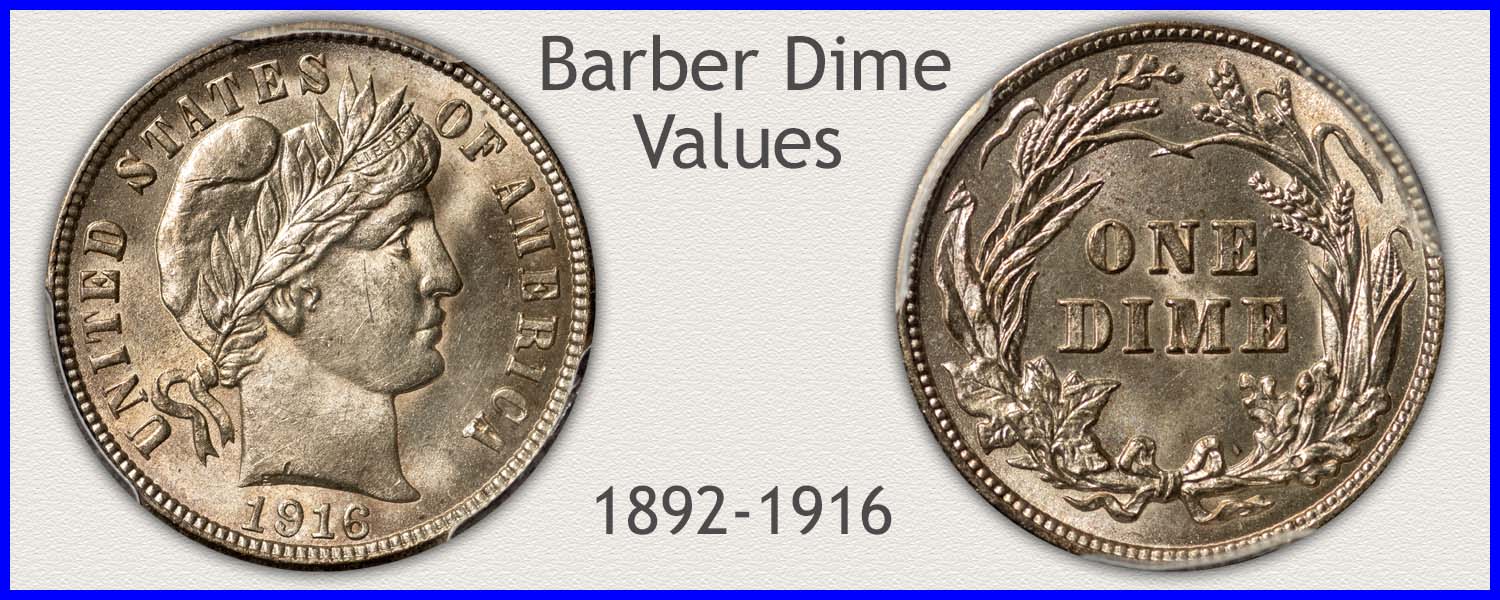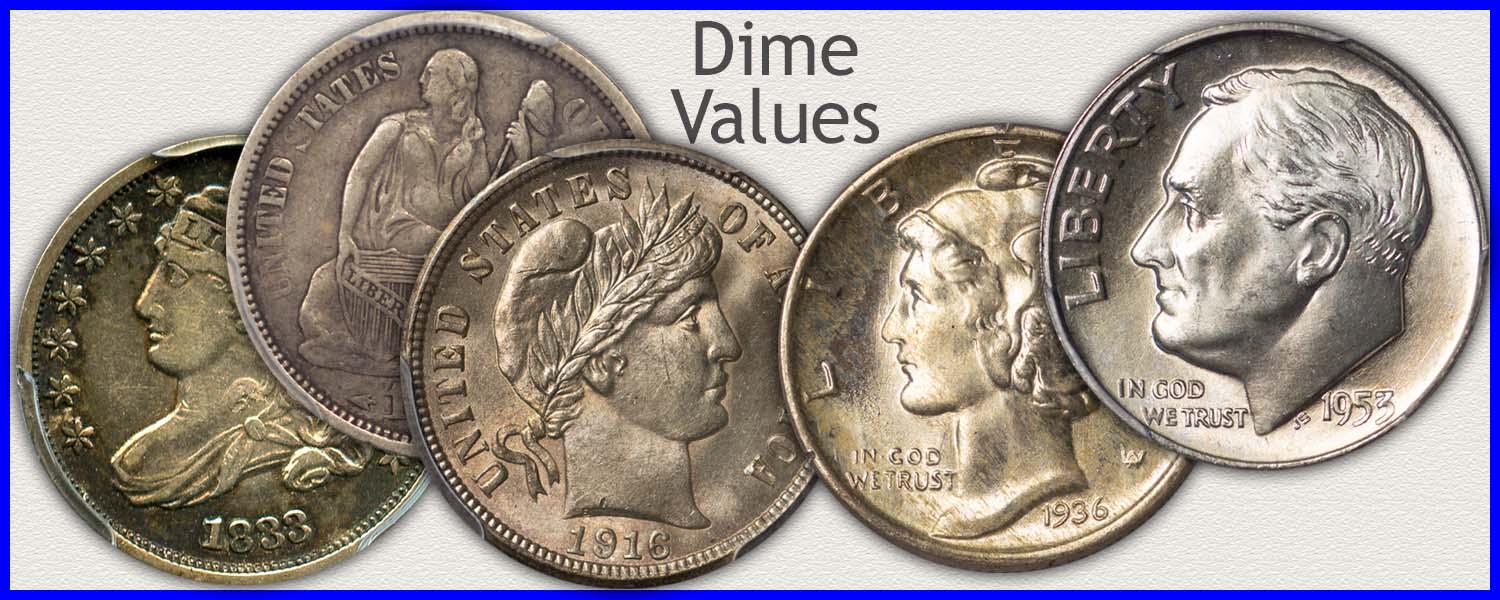Coin Values Moving with Precious Metals: Up-Dated 5/19/2025: Gold $3222 | Silver $32.42
1915 Dime Value
Remaining numbers available are low, and 1915 dime value is a strong $4.80 at a minimum.
Most of the relatively small production of 1915 dimes, over time, became heavily worn due to circulation. A premium coin is recognized when compared to images of different grades of condition. Defined steps confirm; both date and mint, condition, and special qualities of Barber dimes in an evaluation process.
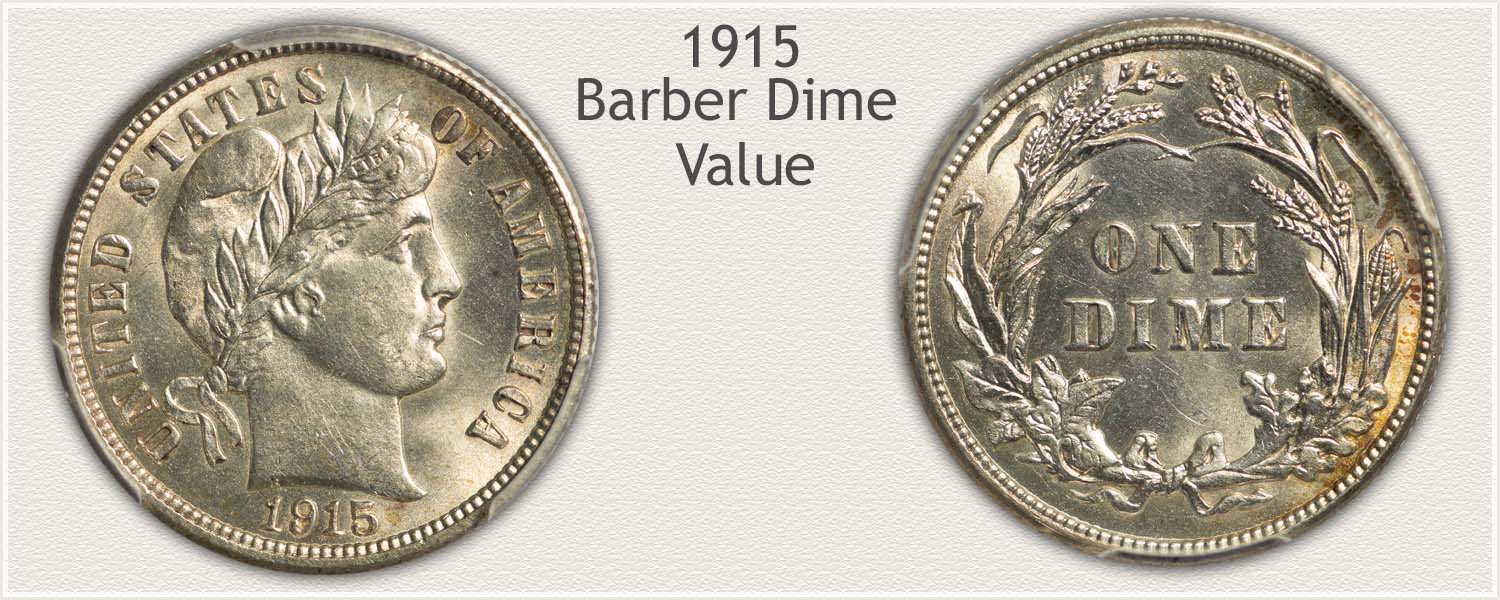
Steps Leading to Value:
- Step 1: Date and Mintmark Variety - In viewing the value chart, note the different mints that produced 1915 dimes. Determine the correct variety to narrow the value range.
- Step 2: Grading Condition - A Barber dime's range of values is narrowed by a close match with grading images.
- Step 3: Special Qualities - Only a small number of nice Barber dimes remain today. Recognize the desirable characteristics of these older coins.
| 1915 Dime Value | ||||
|---|---|---|---|---|
| Condition of Coin | ||||
| Date | Good | Fine | Extremely Fine | Mint State |
| Barber Dime Values Updated | 5/19/2025 | |||
| 1915 | $4.80 | $4.80 | $22 | $109 |
| 1915 S | $5.87 | $32 | $66 | $240 |
Use the chart to determine a range of wholesale values, what a dealer pays for these old Barber dimes.
Step 1: | In Demand Date and Mint Combination Recognized
Identify 1915 Dimes Worth Above Bullion Value
Value of these vintage dimes is narrowed down by identifying the exact mint that struck the coin. The value chart shows dimes from branch mints at a premium over Philadelphia coinage. Note: Additional premiums are found in better condition examples.
In 1915 dimes were struck at two mints, with San Francisco adding a mintmark to identify its production. Collectors pay close attention to these marks illustrated below.
1915-S Barber Dime
"S" Mintmark on Reverse: San Francisco Mint Struck the Coin
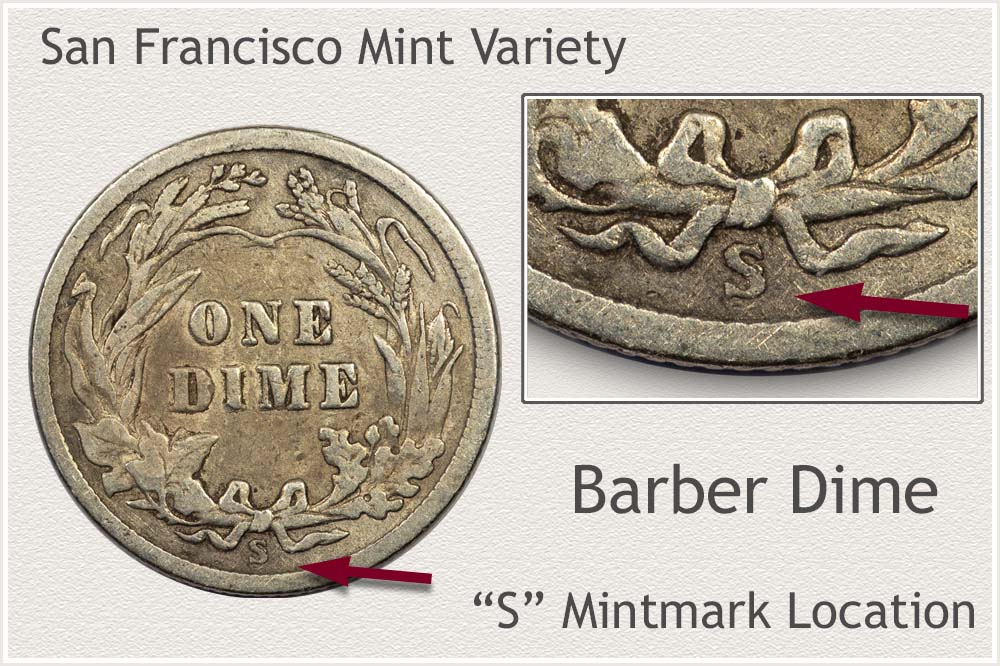
1915 dimes struck at the San Francisco mint are becoming a very sought-after coin. Collectors are beginning to place a high value on those in conditions with finer details visible. To determine its worth, both the date and the mint variety must be confirmed and recorded.
The Barber series dimes produced at San Francisco are all recognizable by a "S" mintmark on the reverse. Just above the rim of the coin, along the bottom, is the "S" mintmark of the San Francisco variety.
1915 Barber Dime
No Mintmark on Reverse: Philadelphia Mint Struck the Coin
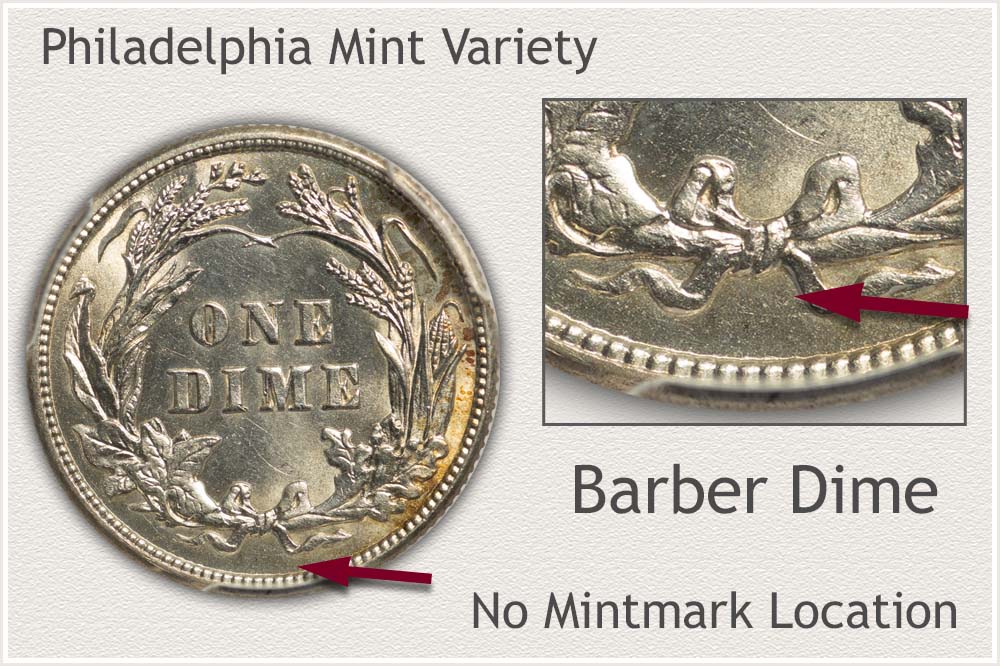
The Philadelphia variety 1915 dime has the distinction of having the fifth lowest mintage of the series from the mint. Only a little more than 5.6 million dimes were struck, a significant decrease from the average annual production of dimes. Collectors are placing strong demand on examples displaying Extremely Fine grade details.
A lack of a mintmark on the reverse distinguishes Philadelphia minted coins from those produced at other mints. Close inspection notes the space between the trailing ribbon ends is completely empty. The Philadelphia mint, at that time, did not use a mintmark on any coins.
Step 2: | Judge Condition to Find Accurate 1915 Dime Value
Identify High Quality and Premium Condition
Eye appeal of a Barber dime is an important factor in value. Overall appearance of a coin is part of determining condition and grade. All collectors "grade" each coin by judging the amount of wear to the surface. Coins are examined against images of different stages of wear representing the different grades.
Comparing your coin to the grade descriptions and images helps find a close match. Key design elements are examined closely to find high value dimes.
Mint State Grade
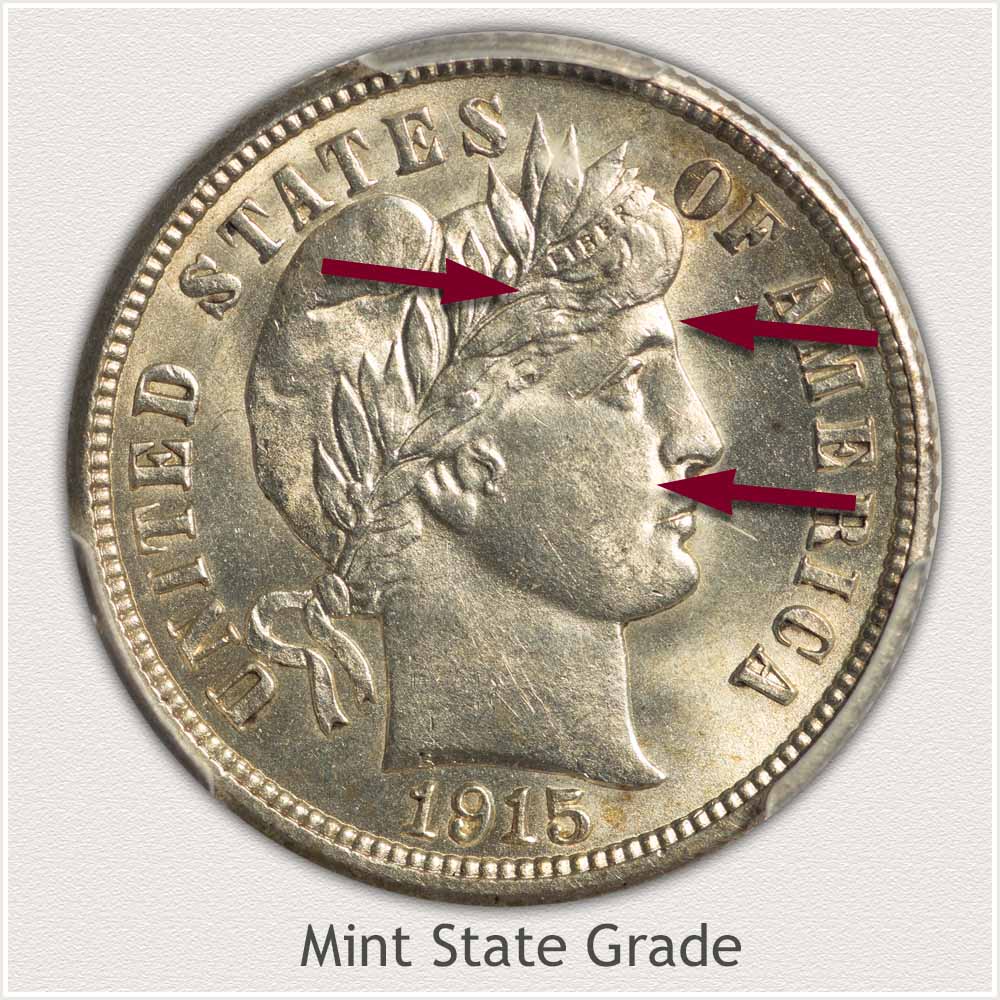
Mint State: A mint state dime is in the same condition as when it was first released from the mint. These high-end Barber dimes never circulated or became worn. The basic criteria of mint state condition is that it shows no signs of use. In order to determine a grade, it is important to inspect a few design elements.
Liberty's brow, a high relief section of the design, is an important feature to inspect for wear. When comparing the eyebrow on the example coin to her cheek below the eye, the eyebrow and cheek show a similar shine. A surface with a lustrous appearance in high spots indicates that it has not been worn. Worn silver becomes a soft grey color and loses brilliance.
Next, examine the hair on Liberty's forehead. The metal is not dulled in any of the hair strands or the wave of hair along her face. By tilting the coin in front of a light, the different angles help you see small changes in color if the metal is worn. With its shine and visible detail, a mint-state coin is appealing to collectors.
Extremely Fine Grade
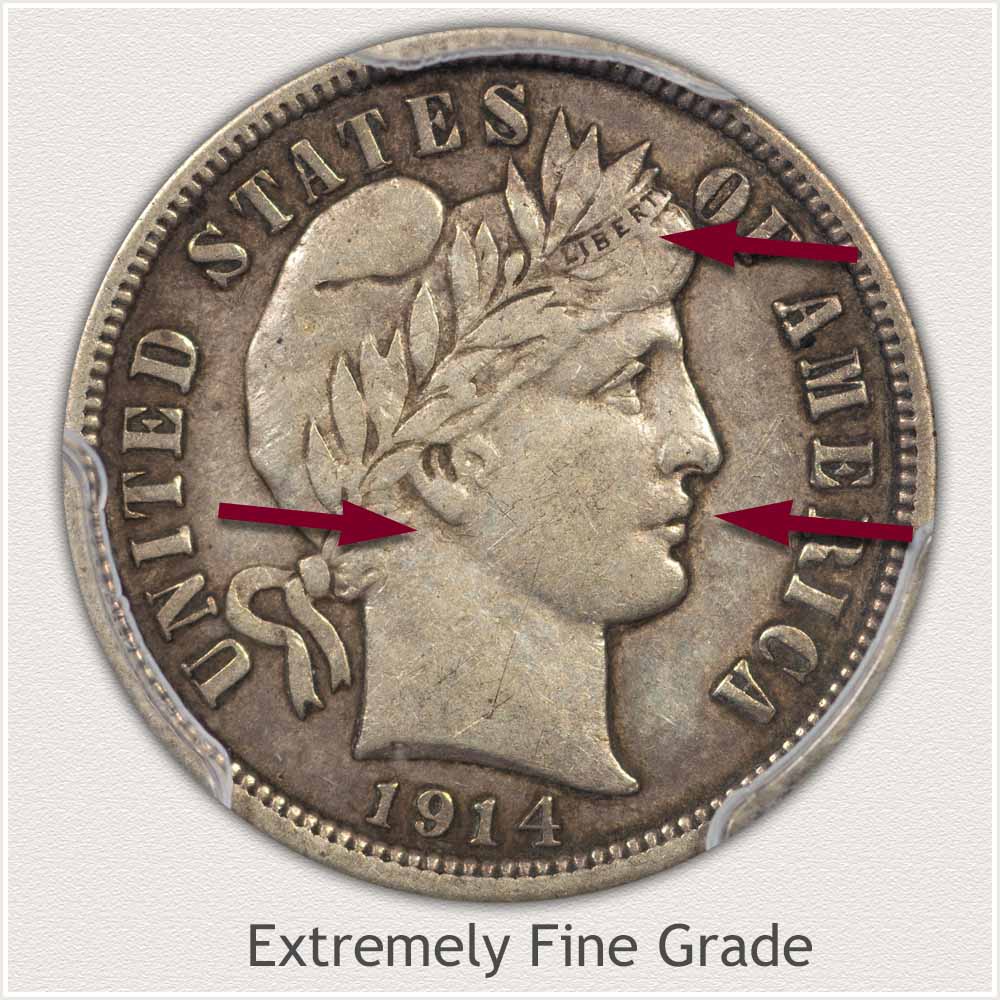
Extremely Fine: An important factor in identifying a collectible quality coin is recognizing a Barber dime with many fine details remaining. Light wear across the entire surface, merely smoothing the very high points, describes the Extremely Fine condition and grade.
One feature is almost all of the original luster has now been replaced with a softer silver-gray color. Another important feature is a complete "Liberty" clear within the headband. The headband's top and bottom edges are also distinct, signifying only light wear and nice quality.
The coin's overall appearance is a "fullness" and rounded cheek to Liberty's portrait. Only minimal smoothing is seen on her face, and high and low relief parts remain. Contours separate chin, cheek, and neck. Throughout, the coin is extremely well-detailed.
Fine Grade
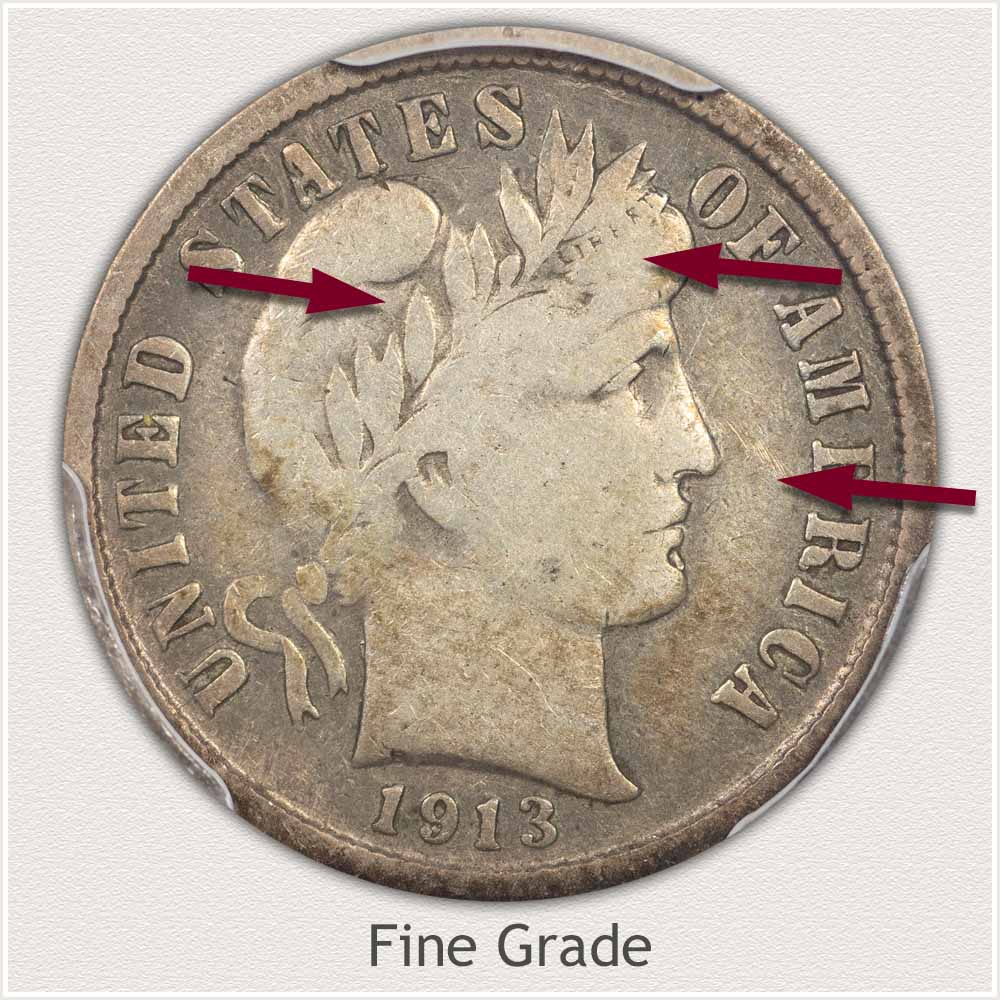
Fine Grade: Visible wear and a blending of design elements is a moderately worn Barber dime. With a few important elements visible, these coins are termed Fine Grade. A moderately worn Barber dime is in demand by beginning and new collectors. They are pleasantly detailed.
First important quality is all letters of "Liberty" within the headband are visible, although "ER" is often faint. Visible lettering is an important feature when considering a coin for the grade. Note also, the slight line defining the hair along the forehead.
Adding detail to the overall design is the top row of laurel leaves are well defined. All upward pointing edges of the leaves are separated from the Liberty cap.
Looking at the coin overall, there remains ample detail; good detail within the laurel leaves, and separation of Liberty's chin, neck, and her cap.
Good Grade
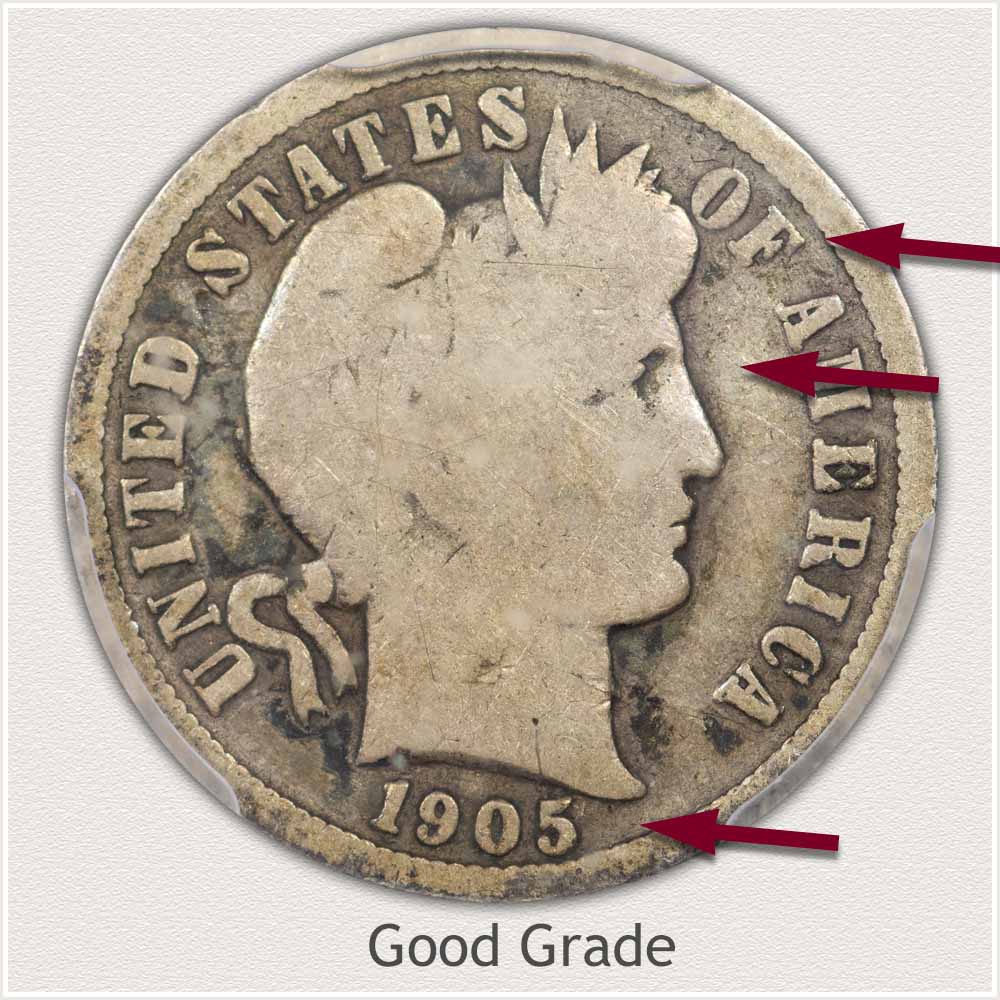
Good Grade: What distinguishes the Good grade from lower quality is the strength and boldness of the remaining features. Few are considered collectible once the rim merges with the legend and begins to fade into the field.
Noticeable is, due to heavy wear, the entire design of Liberty has been reduced to a flat surface. The condition is defined by the lack of central detail, and these coins are classified as Good Grade. Liberty's strong and complete outline ensures that the example dime remains within the grade. While worn, there is still a clear boldness of Liberty rising above the coin's field.
It's also important to note that along the rim the letters of the legend remain full. For a coin to grade as "Good" condition, it needs a distinct legend, fully separate of the rim. The date is also quite strong and clear due to the protection of the rim. Heavy wear that doesn't look "faded," as well as a full rim, adds to the appeal.
How to Video: Grading Barber Dimes
The worth of these Barber dimes is further determined by judging their condition. Video focuses on essential areas to judge. A more precise grading process narrows the range of possible conditions.
Video, Images and Descriptions | Grading Barber Dimes
Step 3: | Special Qualities | How to Inspect Value
Proper Storage of Barber Dimes Maintain Their Value
Often it is the first look at a coin that indicates less than high quality. Barber dimes with a 90% silver to copper alloy need protection from humidity to slow the toning process. Given time these silver coins potentially turn deep shades of grey-black.
Folding paper over a silver coin when stored, plus humidity, is often the cause of Barber dimes becoming very dark in color. Additional damage is the corrosion to the metal by the Sulphur within the paper. An attempt to remove the dark color, and cleaning the coin, just highlights the pitted damage to the surface.
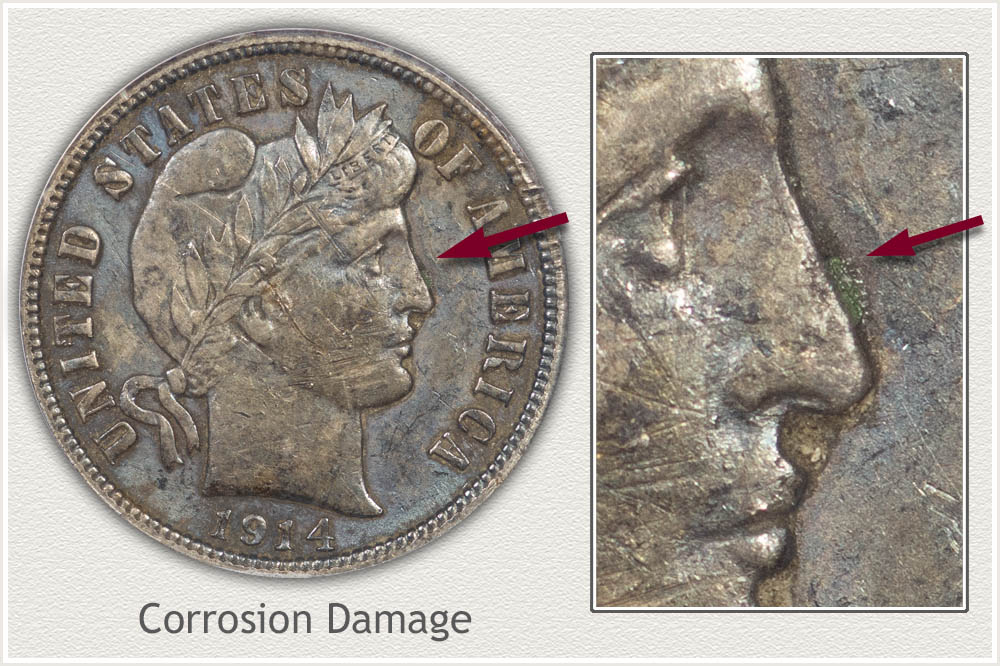
Very dark colors on silver coins requires a close look. Spotting a rough surface to the metal begins to confirm storage damage. Note the discoloration just under Liberty's eye and build-up of corrosion in front of her nose. Collectors avoid problem coins. When assembling collections, eye pleasing examples are sought.
High quality surface preservation is part of judging special qualities. In all grades: worn to mint state (without wear) coins free of damage are potential collector pieces.
Soft shades of grey over the devices blending with deeper color near the rim is the usual progression of toning found on silver coinage.
References
U.S. Mint. 1916 U.S. Mint Annual Report. https://nnp.wustl.edu/library/book/514129
Coin Values | CoinStudy Articles
Date by Date
In Depth Barber Dime Values
1892 to 1916
Barber Dime Value | Dates and Mints Listed
Discover the different dates and valuable mintmarks. Use the step by step method to an accurate identity and value of these old Barber dimes. Grade condition and note mintmarks to complete your assessment.
All Dime Series are featured here. First minted in 1796 there are many rare and collectible varieties to discover.
From the early Bust to the Seated Liberty of 1837-1891. Next the Barber Dime followed by the widely collected Mercury Head dime. Ending with the modern Roosevelt Dimes. Match your coins to the grading images and values charts.
Coin Value Guide | How to Value a Coin Collection
Coin collections either small or large are valued using a method following specific steps. These coins are separated by denomination, series, date and mints. Use the images to identify coins, series and varieties. Details on the steps to take are outlined. Visiting each series page completes the process.
Silver Coin Values | Minimum Values of U.S. Silver Coins
Following the up and down movements in silver price, many,U.S. coins are accurately valued daily. Using the calculator, determine values of silver dimes, quarters, halves, and silver dollars.
Popular Coin Series | Barber Dimes
Barber dimes reside in the midrange of popularity. Compare to other coin series to develop an understanding of the collector base to dime values.
Sell Silver Coins | Identify the Silver Issues
Worth well over face value, vintage U.S. silver coinage is first identified. Recognize your silver coin issues, and using the calculator determine minimum silver value. Listing of dealers to contact finds either a local or online buyers.
★Coin Values Discovery finds 1915 Dime Value and...
Barber dimes are one of many series with premium coin values. Identify your coin and variety, follow a step by step method used by collectors and discover how much old coins are worth.
